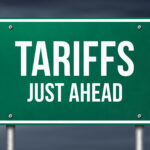Markets Face Headwinds Headed Into October

Markets face headwinds rather than tailwinds headed into October. September was ripe for a sell off. We had been warning that the signs were all there of a market that was overstretched, overvalued, and overdue for a pullback. The S&P 500 was trading two standard deviations above its moving averages. As a reminder, moving averages act like a magnet pulling markets towards them when they trade too far above or below them. The further away they move, the swifter (and more painful) a reversion can be. For example, during this current correction the NASDAQ was down over 12%. While the sell-off was not unexpected, it still caught investors off guard who had become accustomed to the market “only going up”.
So here we are on the last day of September and you may be asking your self “what now”? We have seen the market have a “reflexive rally” in the past few days. This is not surprising either as the markets are all relatively oversold on the short term. It is important to make mention that despite the recent advances, we have been unable to break through the 50 day moving average above us. This points to possible additional selling pressure for the markets. If we are unable to break above the 50 day, it is possible to see a retracement down to the 200 day moving average, or an additional 7.2% decline.
Markets face headwinds rather than tailwinds currently. It appears likely that any additional stimulus program will not be passed, at least not until after the election. The stock market was counting on more stimulus and economic recovery indicators have begun to shift disappointedly as the extra stimulus has now gone dry. The Federal Reserve also made it clear that we should not expect new aggressive intervention from them for now. They have punted the football back to congress, saying it is now in their court to pass a new program. This will likely further concern markets. We are also still dealing with the effects of COVID-19, and the uncertainty of what the winter months may bring in terms of resurgences. We remain in an economic recession and corporate earnings continue to dip. 2021 S&P 500 earnings estimates are down nearly $30 per share since the original estimates made in January 2020. Did I mention we have a presidential election coming up?
With all the headwinds we see, as well as the fact that markets are still very overvalued when compared to longer term means we think investors should remain cautious for now. If you were uncomfortable during this current pullback, you may be taking more risk than necessary. You could consider using any short-term rallies to rebalance your portfolio and adding in some defensive positions until the rest of the headwinds have cleared. I am not suggesting you need to sell all your equity positions, just consider trimming them temporarily. We remain invested and our tactical allocations have continued to perform very well compared to the major indexes. The power in using relative strength and positive momentum to choose allocations means we do not have to take on more risk than we are comfortable with. It also allows us to choose areas that are performing strongly, while excluding the laggards that wind up being drags on performance.
There is no crystal ball when it comes to investing. However, we think investing using emotions, hope, and feelings are not a good strategy. That’s why we rely on math and rules. If you have any questions, you can always email me at ashleyr@victoryfiduciary.com. I am happy to help any way I can. Have a great month!
 Ashley Rosser, President
Ashley Rosser, President
Prior to her career in the financial services industry, Ashley earned her Bachelor of Science in Nursing from Cedarville University.
Ashley decided to make a career change from her ten years within the healthcare industry as a pediatric emergency room nurse to retirement and 401K investment planning. She joined Victory Wealth Partners in 2008 after obtaining her Series 65 professional financial license and went on to earn her AIF (Accredited Investment Fiduciary) professional designation from the Center for Fiduciary Studies.












